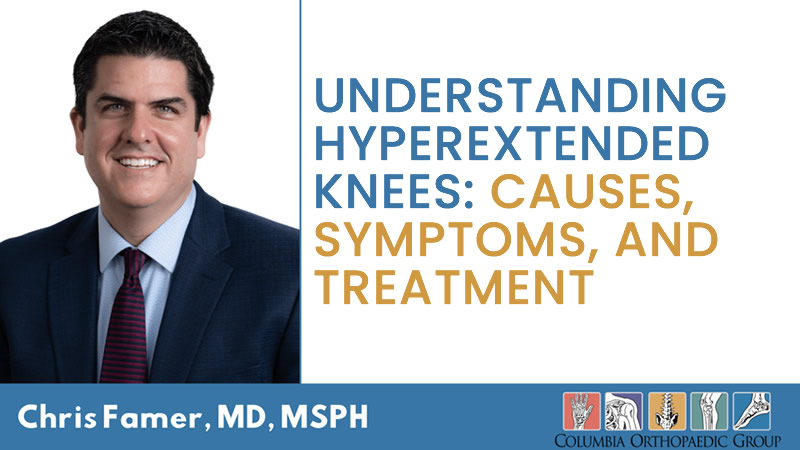
Understanding Hyperextended Knees: Causes, Symptoms, and Treatment
At Columbia Orthopaedic Group, we have eight sports medicine physicians who know how to treat a hyperextended knee. Call us (573) 443-2402 or click on the "request appointment" button to make an appointment. From conservative care to potential surgery, here's everything you need to know.
Knee injuries are common, and one particular condition that often goes unnoticed until it becomes a problem is hyperextended knees. In this blog post, we'll delve into what hyperextended knees are, their causes, symptoms, and explore some potential treatment options. Understanding this condition is crucial for preventing further damage and maintaining healthy knee joints.
What Are Hyperextended Knees?
Hyperextension of the knee occurs when the knee joint bends beyond its normal range of motion, typically in the direction opposite to how it naturally bends. This can happen due to various factors and can be either acute or chronic. Acute hyperextension occurs as a sudden injury, while chronic hyperextension may develop over time.
Causes of Hyperextended Knees
- Traumatic Injury: A sudden, forceful blow to the knee, or an awkward landing during sports or physical activities, can lead to hyperextension.
- Ligament Laxity: Individuals with naturally lax ligaments may be more prone to hyperextension, as their knee joints have less stability.
- Muscular Imbalance: Weak or imbalanced muscles around the knee joint can contribute to hyperextension, as they may not provide adequate support.
- Improper Technique: Poor form in activities like weightlifting, running, or dancing can put extra stress on the knee joint and lead to hyperextension over time.
Symptoms of Hyperextended Knees
Identifying hyperextended knees is essential for timely intervention. Common symptoms include:
- Knee Pain: Pain is a primary symptom, often felt at the back of the knee joint.
- Swelling: The affected knee may become swollen due to inflammation.
- Instability: Hyperextended knees may feel unstable or wobbly, making it difficult to stand or walk.
- Limited Range of Motion: Reduced ability to bend or straighten the knee fully.
- Difficulty in Weight-Bearing: Putting weight on the affected knee may be uncomfortable or painful.

Treatment Options
If you suspect or have been diagnosed with hyperextended knees, here are some treatment options to consider:
- Rest and Ice: Resting the affected knee and applying ice can help reduce pain and swelling, especially in the acute phase.
- Physical Therapy: A physical therapist can create a customized exercise plan to strengthen the muscles around the knee, improving joint stability.
- Knee Bracing: Wearing a knee brace or support can provide added stability and reduce the risk of further hyperextension.
- Anti-Inflammatory Medications: Nonsteroidal anti-inflammatory drugs (NSAIDs) can help manage pain and inflammation.
- Proper Technique: If your hyperextension is caused by improper technique in sports or physical activities, working with a coach or trainer to correct your form is essential.
- Surgery (in severe cases): In extreme cases with ligament damage or structural issues, surgery may be necessary to stabilize the knee joint.
Preventing Hyperextension
Prevention is key when it comes to hyperextended knees:
- Strengthen Muscles: Regularly engage in exercises that target the muscles surrounding the knee joint to improve stability.
- Warm-Up: Always warm up before engaging in physical activities to prepare your muscles and joints.
- Proper Footwear: Wear appropriate footwear with good arch support and cushioning to reduce the risk of knee injury.
- Balance Training: Incorporate balance and proprioception exercises into your routine to improve joint awareness.
Hyperextended knees can be painful and limit your ability to engage in daily activities or sports. If you suspect you have this condition, it's essential to seek medical advice promptly. With proper treatment and preventive measures, you can manage the symptoms, strengthen your knee joint, and minimize the risk of future hyperextension injuries. Remember, taking care of your knees is crucial for maintaining an active and healthy lifestyle.
At Columbia Orthopaedic Group, we take a team-based approach to treating sports injuries. Depending on the type and severity of the injury, the team may include a primary care sports medicine physician, orthopedist, and physical therapist.

Our physicians are board-certified and fellowship-trained to provide the highest level of orthopaedic care to our patients.
Schedule an appointment, call 573-443-2402 or request online.
